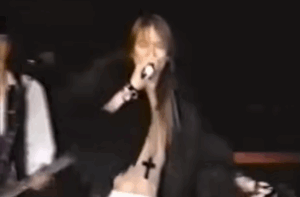What Was Guns N’ Roses’ Most Controversial Song

via @panamakinal / YouTube
When Guns N’ Roses released the ultra-deluxe Appetite for Destruction: Locked N’ Loaded box set in 2018, fans were thrilled by its expansive collection of rare tracks, memorabilia, and lavish packaging. Yet one glaring omission stood out—a track that had long haunted the band’s legacy. “One in a Million”, once part of their 1988 G N’ R Lies EP, was nowhere to be found. The decision was not debated heavily, according to guitarist Slash. In fact, the band quickly agreed to leave it out, indicating a quiet but decisive distancing from the track.
The controversy around “One in a Million” stems not from its musical style, but from its lyrics—lines that include racial and homophobic slurs, presented without much filter or subtlety. At the time of its release, the track was framed as Axl Rose’s raw reaction to his early days in Los Angeles, but the language he chose to use provoked widespread backlash. It wasn’t just casual listeners who were offended; critics, fans, and even the band’s own circle expressed discomfort with the song.
Over the decades, the track has remained a dark stain on the band’s reputation. And while it may have been left off their 2018 collection, its legacy is still debated. Why did it get made in the first place? And what does it say about the band, especially in an era when rock stars were often given free passes for “edginess” that crossed into bigotry?
A Track That Crossed the Line
One in a Million debuted on G N’ R Lies, an album that combined earlier live recordings with a batch of new acoustic songs. While the acoustic set featured lighter fare like “Patience,” it ended with a bombshell. One in a Million included explicit slurs against Black people, immigrants, and gay men—terms rarely heard on a major-label release, even in the freewheeling rock world of the late ’80s.
The backlash was immediate and fierce. Though Rose insisted the song reflected his fear and disorientation upon arriving in Los Angeles, few listeners could excuse the hate-laden language. Critics blasted the band for releasing it, and longtime fans were left confused and disappointed. Some suspected that the offensive lyrics were meant to provoke attention rather than offer authentic insight.
Rose’s attempts to explain himself only worsened the situation. He argued that certain slurs “didn’t necessarily mean black,” and cited rap groups like N.W.A. as justification for his use of racial epithets. But the context wasn’t the same, and the attempt at deflection didn’t land. Even the sarcastic “apology” embedded in the album artwork—“my apologies to those who may take offense”—felt disingenuous.
View this post on Instagram
Fallout Within the Band
The controversy didn’t just play out in public—it also caused friction within Guns N’ Roses itself. Axl Rose’s insistence on including the song left some bandmates in an uncomfortable position, particularly guitarist Slash, who has biracial heritage. In a 1990 interview, Slash admitted to feeling conflicted. Friends and family questioned him about the song, and some believed he should have stopped its release.
Slash explained that the band didn’t operate on a veto system; they respected each other’s creative space. But in hindsight, he acknowledged that One in a Million was a serious misstep. He described Rose as “a naive white boy from Indiana” whose upbringing shaped his worldview—and not always for the better. Yet even as he defended Rose’s intentions, Slash couldn’t say the song’s release was justified.
That conflict—between personal loyalty and public accountability—speaks volumes about the pressures within the band. For all of Guns N’ Roses’ reputation as a tight-knit unit, this was a clear moment where internal ethics clashed with artistic freedom. And while no one blocked the song at the time, it became a lesson they couldn’t ignore.
View this post on Instagram
A Song Best Left Behind
Decades later, One in a Million remains one of the most talked-about tracks in Guns N’ Roses’ discography—but not in a good way. It’s rarely performed, never re-released, and mostly ignored in retrospectives. When the band curated their massive Locked N’ Loaded box set, they left the song out without hesitation. As Slash put it, “It just didn’t have any place in that box set.”
But the exclusion didn’t erase the questions that still hang over it. Why did the band allow it to be released in the first place? How did a major label like Geffen let it pass without objection? And what does the track’s survival on G N’ R Lies say about rock culture’s tolerance for shock value—even at the expense of real harm?
Today, One in a Million stands as a cautionary tale. It shows how recklessness, when cloaked as authenticity, can permanently damage a band’s image. Even fans who admire Guns N’ Roses for their rawness and honesty often admit this song crossed a line. And the band’s own silence about it for years only made the damage harder to repair.
View this post on Instagram












